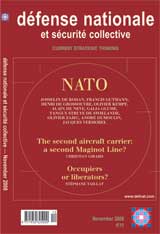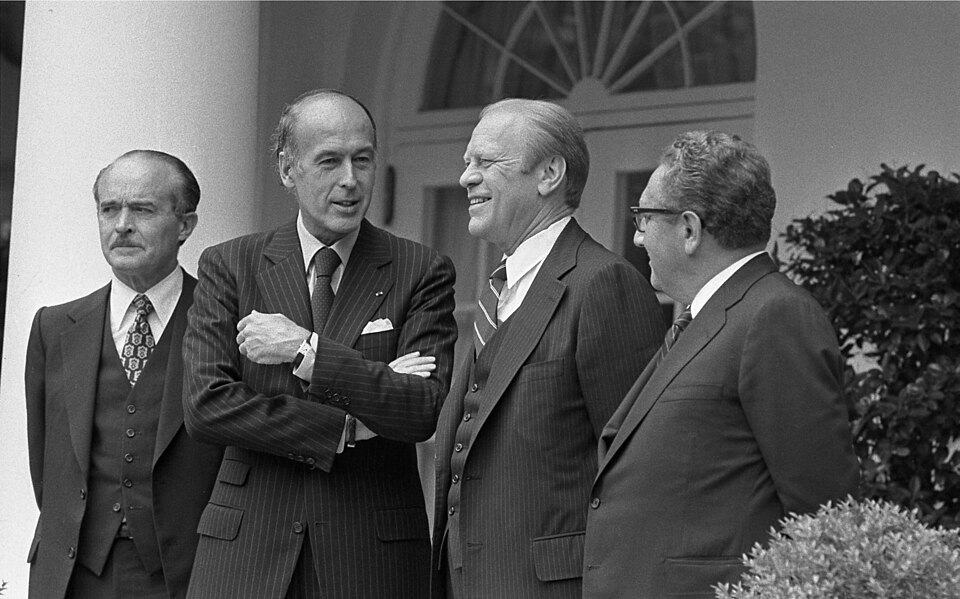Edition anglaise

November 2008 - n° 713
France and NATO: what kind of renewal? - Josselin Rohan (de)
France already plays a leading role in a vastly changed NATO. Its full participation in the Organization’s structures would above all have a political significance vis-à-vis its partners, aimed at demonstrating the complementarity between the Alliance and the development of European Security and Defence Policy, which is still our priority objective. Yet the debate on changing our position must not obscure the big issues: clarification of the Alliance’s missions and its ability to deal with today’s security challenges.
The evolution of NATO, and France's position - Francis Gutmann
France-Otan, les sujets demeurent : Europe et Atlantique, indépendance et solidarité ; mais le contexte a changé. Quelles conséquences pour la France ? L’Otan, avec qui, pour quoi faire ? Rentrer dans l’organisation militaire intégrée servirait-il ou desservirait-il l’Europe de la défense ? Le problème général des relations franco-américaines n’est pas celui de l’Otan. Sauvegarder en tout cas notre indépendance, fondement aux yeux du monde de notre politique étrangère depuis un demi-siècle.
NATO's Bucharest summit: Europe/United States - Henri Grossouvre (de)
NATO’s biggest summit was held in Bucharest in April 2008. In his opening address, President Bush said that NATO membership for Georgia and Ukraine was a priority for Washington. But following a Franco-German move, in consultation with Moscow, Tbilisi and Kiev were denied official candidate status, a historic event illustrating America’s relative geopolitical decline.
2008: from Bucharest to Strasbourg - Olivier Kempf
For the Alliance, 2008 has been a fairly difficult year: while the Bucharest summit was satisfactory, particularly with the adoption of a commitment to Afghanistan, the war in Georgia put a question mark over an unstable equilibrium because of its repercussions not only on the ongoing process of enlargement but also on issues such as ballistic missile defence or even Kosovo. As for France, it continues along the path of rapprochement and the debate on defence centres around NATO.
NATO: the challenges of cohesion - Alain Neve (de), Tanguy Struye de Swielande, Galia Glume
Despite often being seen as one of the relics of the Cold War, the Atlantic Alliance is still the keystone of European security. Nonetheless, preserving the world’s greatest military alliance has happened to the detriment of some of its greatest assets: the cohesion of its members, the coherence of its objectives and awareness of its limitations. After the Bucharest summit and a few months from the Atlantic organization’s 60th anniversary, it is useful to take stock of its perspectives and the challenges on the horizon.
NATO and the Georgian crisis - Olivier Kempf
NATO has suffered from the Georgian war, which it had provoked indirectly and to which it has not brought any solution. The weakness of the United States and the reassessment of Article 5 have once again given prominence to the debate on Atlantic decoupling—even if that term has rarely been used. The Alliance is henceforth obliged to play a minor role in which, finally, it has few real choices.
NATO and the anti-missile shield - Olivier Zajec
Between 2007 and 2008 the plan to install a ballistic missile defence system in Europe changed in both nature and degree. In nature, because now the American system that has been accepted by Poland and the Czech Republic seems destined to be an integral part of the future European architecture, and this was confirmed at NATO’s Bucharest summit in April 2008. And in degree because this policy of presenting a fait accompli, which the uncoordinated Europeans were unable to change, aggravates even more the already very tense relations with Russia. Looking ahead to the Strasbourg summit in 2009, this article asks how Europe could use NATO to refocus the anti-missile debate by becoming involved at the highest level in the integrated architecture being prepared and ensure that the now unavoidable project aligns with its own interests.
Moves to withdraw nuclear weapons from NATO? - André Dumoulin
The American nuclear landscape in Europe could change in the coming months. The signs are already there, and a new strategic posture will have major implications for the Europeans as well as for the visibility of France’s deterrent force. Nonetheless, the Georgian crisis, tensions with Iran, Russian muscle flexing and NATO’s line cast doubt on the idea that a partial or even complete withdrawal of American B-61 bombs could be on the agenda at the Alliance’s 60th anniversary in April 2009.
NATO's Agencies - Jacques Vermorel
In NATO’s complex organization the role of its Agencies is discreet but essential. Initially exceptions to the co-operative structures of NATO, they have finally themselves become more important than these structures. The Agencies have forged some effective tools (including some for military operations), of which neither NATO HQ nor some national capitals feel that they are fully in control.
Deterring the WMD threat - Nicolas Jenner
The proliferation of weapons of mass destruction is continuing. However, defence against WMD states cannot be the same as the deterrence by retaliation of Cold War days. An indirect strategy is now called for—deterrence by denial—and this means our forces and force posture will need to be adapted.
'Hacktivism' - a new threat? - Laurence Ifrah
Should we be worried about ‘hacktivism’? This article offers a brief analysis of a concept that was the brainchild of an individual who, in just a few weeks, mobilised an international network of more than 11,000 militants prepared to take action in both the real and virtual worlds. With a mix of conviction, manipulation and opportunism, it is clear that individuals can influence people to strike at and destroy a target, while others will adopt a timely ‘just cause’ to embark upon illicit or even criminal activities.
The second aircraft carrier: a second Maginot line? - Christian Girard
Symbolic of a military strategy for France and Europe that will necessarily put the accent on space and the oceans to meet the challenges of the twenty-first century, the question of aircraft carriers is still generally misunderstood within France’s defence community. The reasons put forward for deferring a decision on the second carrier are not the fundamental ones. This issue has to be revisited to prepare for the decision in 2011 and avoid making a mistake like the decision on the Maginot Line.
Western forces in Iraq and Afghanistan-occupiers or liberators? - Stéphane Taillat
Western doctrine is developing into one where military forces maintain a long-term presence in stabilisation operations. This trend would seem to be counter to pressure from society to reduce the visibility of the military. The antibody doctrine, developed by US military leaders between 2003 and 2006, contributed to the progressive deterioration of security conditions in Iraq and moreover begs the question as to whether Western military forces are seen as occupiers or liberators. Far from being entrenched, the impression can be quickly changed, as long as the conditions of such change are well thought out.
New wars for honour: the US intervention in Iraq - Thomas Lindemann
This argument on the symbolic origins of the US war against Iraq does not claim that all wars are now down to a determination not to lose face. A desire for gratitude may be the main reason why a war (like the American war against Taliban-ruled Afghanistan) is sparked off, or a secondary factor that merely serves to justify it. However, even in the latter case, the minimal desire for gratitude may be an obstacle in the way of starting a war for profit. There is little doubt that it took 11 September and the refusal of the Iraqi authorities to cooperate fully with the IAEA inspectors for the hawks in the Bush administration to be able to push the option of war against Iraq effectively
Towards a secularized defence - Frédéric Sternenberg
The recently announced defence restructuring measures constitute a new wave of consolidation on the human and territorial levels, as well as in terms of functions and the effects on the public. This new process forms part of a tendency of reducing the military to its function of basic soldiering, at the same time as this function itself is subject to changes. The particularity of the profession of arms thus finds itself under discussion. War is now far-off and localised: it poses risks of course, but not threats. The reduction of the military to its ‘core business’ implies a dismembered institution. Ultimately, this is a process leading to the ‘dumbing down’ of the military, its condition, its world, its ethos; and hence possibly to a trivialised defence.




_astronaut_Sophie_Adenot_(jsc2025e058846_alt).jpg)



